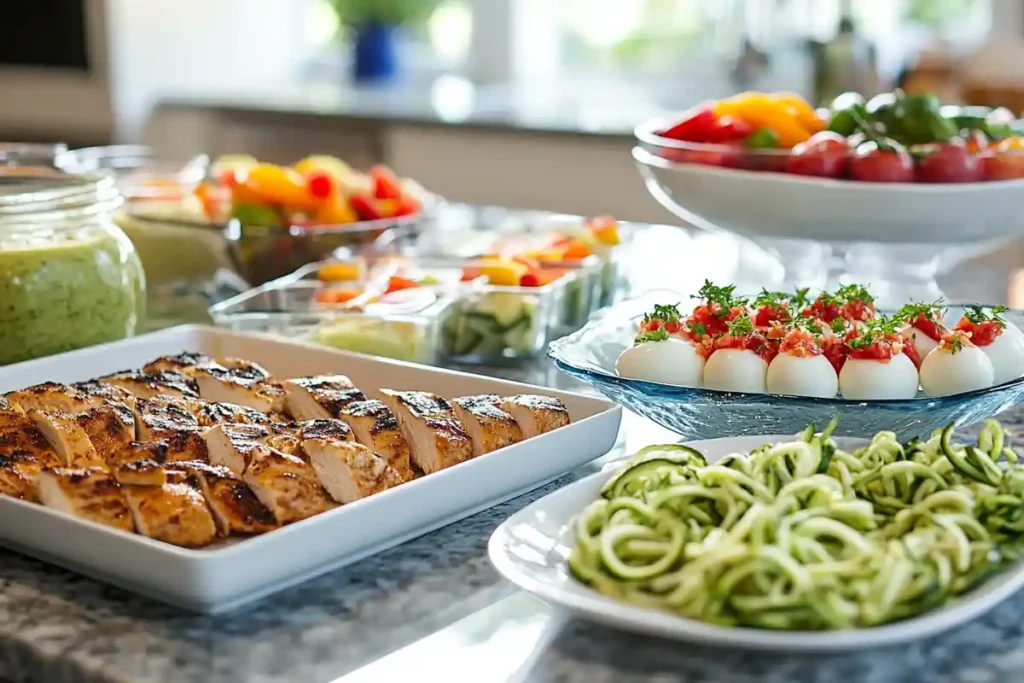introduction bariatric recipes
Bariatric surgery is a transformative journey toward better health, but it comes with significant lifestyle changes—especially when it comes to eating. That’s where bariatric recipes shine. This guide explores meal ideas tailored to help you stay on track without sacrificing flavor. From nutritional benefits to easy recipes, you’ll learn everything about crafting meals that nourish your body while supporting your weight-loss goals.
Let’s dive into Part 1 to get an overview of what bariatric recipes are and why they matter.
Introduction to Bariatric Recipes
What Are Bariatric Recipes ?
Bariatric recipes are specially crafted meals designed for individuals who’ve undergone bariatric surgery. These recipes focus on high-protein, low-carb, and nutrient-rich ingredients to promote healing, maintain muscle mass, and support long-term weight management. Since post-surgery portions are smaller, every bite matters.
These meals aren’t just about following dietary restrictions—they’re about creating delicious and satisfying dishes that meet your nutritional needs. From breakfast to dessert, there’s no shortage of options to explore, ensuring you never feel deprived.
Importance of Following Bariatric Diets Post-Surgery
After bariatric surgery, your stomach’s capacity is significantly reduced, which makes proper nutrition critical. Consuming nutrient-dense meals ensures your body gets the vitamins, minerals, and protein it needs to recover and thrive. Skipping out on a balanced bariatric diet could lead to deficiencies, slowed healing, or even weight regain.
Moreover, bariatric diets are tailored to specific phases of recovery—starting with liquids, progressing to soft foods, and eventually incorporating solid meals. Recipes aligned with these stages make the transition smoother and more enjoyable. They’re also key to maintaining energy levels, supporting weight loss, and sustaining overall health.
By focusing on bariatric-friendly ingredients and portions, you can embrace your new lifestyle with confidence and creativity.
Benefits of Bariatric Recipes
Nutritional Needs After Bariatric Surgery
Bariatric recipes are carefully designed to meet the unique nutritional needs of post-surgery patients. After surgery, your body requires higher protein intake to aid recovery, maintain muscle mass, and promote healing. These recipes are typically low in carbohydrates and free of added sugars, making them ideal for sustaining energy levels without compromising weight-loss goals.
Furthermore, incorporating nutrient-rich foods ensures that your body gets the necessary vitamins and minerals, reducing the risk of deficiencies. For instance, dishes like zucchini noodles with grilled chicken provide a perfect blend of protein and fiber without unnecessary calories.
How Bariatric Recipes Help in Recovery and Weight Maintenance
Post-surgery, every bite counts, and bariatric recipes make those bites delicious and purposeful. Eating nutrient-dense meals helps control portion sizes while keeping you full longer. High-protein options like Greek yogurt parfaits and deviled eggs are satiating and easy to digest, making them staples in any bariatric diet.
Additionally, sticking to bariatric recipes ensures consistency in following dietary guidelines. This is critical in preventing complications, regaining energy, and achieving long-term success in weight maintenance. Recipes such as sugar-free chocolate lava cake can also satisfy your sweet cravings without derailing your progress.
For creative meal ideas, check out this collection of healthy recipes that can be adapted for bariatric diets.
Key Ingredients for Bariatric-Friendly Meals
High-Protein Ingredients
Protein is the foundation of bariatric recipes. From lean meats like chicken and turkey to plant-based options like tofu and lentils, these ingredients provide the building blocks for muscle repair and overall recovery. Don’t forget whey protein powder, which is a versatile addition to shakes and baked goods.
Low-Carb and Sugar Alternatives
Reducing carbohydrates is essential in bariatric diets. Ingredients like almond flour, cauliflower, and zucchini serve as excellent low-carb substitutes in recipes. For sweetness, opt for natural, calorie-free alternatives like stevia or monk fruit instead of sugar.
Vegetables and Healthy Fats
Fresh vegetables are non-negotiable in any bariatric meal. They’re packed with fiber, vitamins, and minerals, supporting digestion and overall health. Pair them with healthy fats such as avocado, olive oil, and nuts, which help you feel full while providing essential nutrients.
By using these key ingredients, you can whip up dishes like a low-carb sushi bowl or a ginger shrimp noodle salad. For more inspiration, explore nutrient-dense recipe ideas.
Top 10 Bariatric Recipes for Every Meal
Breakfast: Protein-Packed Greek Yogurt Parfait
Start your day with a nutritious and easy-to-make bariatric recipe. Combine non-fat Greek yogurt, fresh berries, and a sprinkle of granola for a perfect breakfast. Greek yogurt offers a high protein boost, while the berries provide antioxidants. You can drizzle a bit of honey for natural sweetness if desired.
Lunch: Zucchini Noodles with Grilled Chicken

Replace traditional pasta with zucchini noodles for a low-carb twist. Add grilled chicken for protein and toss everything in a light garlic olive oil sauce. This dish is flavorful, filling, and aligns with bariatric guidelines by keeping carbs minimal.
Dinner: Ginger Shrimp Noodle Bowl
Looking for a quick and satisfying dinner? This recipe uses shirataki noodles (low-calorie) paired with sautéed shrimp, fresh ginger, and a touch of soy sauce. It’s light yet full of bold flavors, making it a go-to for bariatric-friendly dinners.
Snack: Elevated Deviled Eggs
Deviled eggs aren’t just for parties! These are high in protein and easy to prepare. Mix boiled egg yolks with a little Greek yogurt, mustard, and spices. Garnish with paprika for an extra kick.
Dessert: Sugar-Free Chocolate Lava Cake
Satisfy your sweet tooth with this sugar-free dessert. Use almond flour, cocoa powder, and a sugar substitute like stevia to create a decadent lava cake that’s bariatric-approved.
Seasonal Special: Shake Recipes for Every Season
Shakes are a bariatric favorite due to their versatility. Blend whey protein with seasonal ingredients like pumpkin spice in fall or fresh berries in summer. They’re great for a quick meal replacement or a nutritious snack.
Quick Bites: Low-Carb Sushi Bowl
Combine cauliflower rice with fresh vegetables, avocado, and cooked shrimp for a bariatric-friendly sushi bowl. A drizzle of low-sodium soy sauce ties it all together.
Appetizer: Blue Cheese Dressing with Veggies
Pair this creamy dressing made with Greek yogurt and crumbled blue cheese with fresh-cut veggies. It’s a healthy snack or appetizer that satisfies without overloading on calories.
Comfort Food: Turkey Meatballs in Tomato Sauce
Make these tender meatballs with lean ground turkey and almond flour for a high-protein, low-carb version. Serve them with zucchini noodles or on their own with marinara sauce.
On-the-Go: Banana Whey Protein Pancakes
For a quick breakfast, whip up these pancakes using banana whey protein powder. They’re light, fluffy, and perfect for meal prepping.
For more delicious recipe ideas, check out leftover chicken recipes.
How to Create Your Own Bariatric Recipes
Understanding Portion Sizes for Bariatric Diets
When creating bariatric recipes, portion control is essential. Post-surgery, your stomach can only handle small amounts of food, so focus on quality over quantity. Use a food scale or measuring cups to ensure proper servings. For example, aim for 3–4 ounces of protein per meal paired with small portions of vegetables or low-carb sides.
Balancing Macronutrients

A well-balanced bariatric recipe includes protein, healthy fats, and a controlled amount of carbohydrates. For instance, a plate of grilled chicken (protein), avocado slices (healthy fats), and a side of steamed broccoli (low-carb vegetable) hits all the right notes.
Experiment with ingredients like Greek yogurt, almond flour, and zucchini to replace calorie-dense foods. Incorporating versatile ingredients allows you to enjoy a variety of meals while adhering to bariatric guidelines.
Adapting Traditional Recipes
Love your favorite comfort foods? You can adapt them into bariatric-friendly dishes. Swap pasta for zucchini noodles, breadcrumbs for almond flour, and sugar for natural sweeteners. Even desserts like cakes and cookies can be modified by using protein powder and sugar-free alternatives.
When adapting recipes, focus on cooking techniques like baking, grilling, or steaming to reduce added fats. For inspiration, explore this guide to ingredient substitutions.
By following these tips, you can turn any recipe into a delicious, bariatric-approved dish. Let your creativity shine in the kitchen, and you’ll discover that healthy eating can be both satisfying and flavorful.
FAQs About Bariatric Recipes
Right after surgery, your diet will primarily consist of liquids and pureed foods. Smooth soups, protein shakes, and sugar-free gelatin are commonly recommended. It’s crucial to follow your healthcare provider’s guidelines during this phase. As your body heals, you can gradually introduce soft and solid bariatric recipes that focus on high-protein and nutrient-dense ingredients.
Protein intake is a cornerstone of bariatric diets. On average, most patients need about 60–80 grams of protein daily, depending on their specific needs. High-protein bariatric recipes, like grilled chicken with zucchini noodles or a whey protein shake, make it easier to hit these targets without feeling overwhelmed.
Yes! Herbs and spices are a fantastic way to add flavor to your meals without adding calories or sugar. Seasonings like garlic, oregano, and paprika can transform simple bariatric recipes into delicious dishes. Avoid pre-made spice blends that may contain hidden sugars or salt.
Store-bought sauces can be tricky because many contain added sugars and fats. Look for low-calorie, sugar-free options or make your own at home. For example, a homemade marinara sauce using fresh tomatoes and basil is both bariatric-friendly and flavorful.
Tips for Staying Consistent with a Bariatric Diet
Meal Prepping for Success
Consistency is key when following a bariatric diet, and meal prepping can make it easier to stay on track. Set aside time each week to plan and prepare your meals. Portion them into small containers for easy grab-and-go options. Focus on simple bariatric recipes like protein-packed Greek yogurt parfaits or turkey meatballs.
Meal prepping also reduces the temptation to reach for unhealthy snacks or fast food. Having ready-made meals ensures you stick to your nutritional goals, even on busy days.
Overcoming Common Challenges
Adapting to a bariatric lifestyle comes with challenges, but planning ahead can help you overcome them. For instance, if you struggle with cravings, keep healthy snacks like deviled eggs or protein shakes on hand. If dining out is a challenge, check menus in advance and choose options that align with your dietary needs.
Remember, your journey is about progress, not perfection. By leaning on tools like bariatric recipes and a solid meal plan, you can maintain consistency and achieve long-term success.
Conclusion and Call to Action
Embracing Your Bariatric Journey with Delicious Recipes
Adopting a new lifestyle after bariatric surgery doesn’t mean giving up on enjoying food. With bariatric recipes, you can create meals that are both nutritious and delicious, ensuring you meet your health goals without sacrificing flavor. By focusing on high-protein, low-carb ingredients and maintaining portion control, these recipes empower you to embrace a sustainable, healthy way of eating.
Join a Bariatric Community or Try New Recipes Today!
Staying connected to a supportive community can provide motivation and inspiration. Share your favorite bariatric recipes or discover new ones that fit your dietary needs. Whether you’re trying protein-packed breakfasts, satisfying dinners, or guilt-free desserts, there’s no shortage of ideas to keep your meals exciting. Take the first step today—plan your menu, prep your ingredients, and enjoy the journey toward a healthier you!
Bonus Resources and Next Steps
Explore More Recipe Ideas and Tips
To keep your bariatric meal plan fresh and interesting, explore a variety of resources tailored to your needs. From quick snacks to gourmet meals, there are countless ways to customize bariatric recipes to your taste. Don’t hesitate to experiment and adapt traditional dishes with healthy swaps.
Stay Educated and Inspired
Your bariatric journey doesn’t end with surgery—it’s an ongoing commitment to your health and happiness. Regularly consult with healthcare professionals and dietitians to fine-tune your nutritional plan. Engage with online forums or support groups to exchange tips, meal ideas, and success stories.
For even more inspiration, check out rotisserie chicken recipes for versatile and bariatric-friendly meal ideas. Staying informed and creative in the kitchen is the key to achieving and maintaining your health goals.

